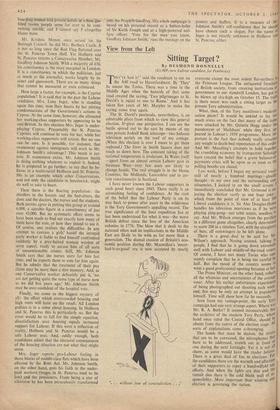View from the Left
Sitting Target ?
By DESMOND DONNELLY (Ex-MP, now Labour candidate, for Pembroke)
frlitiY.VE had it!' said the roadman to me on 1 the A40 road to Haverfordwest. By 'They' he meant the Tories. There was a time in the Middle Ages when the hazards of that same road created the saying, 'Two pilgrimages to St. David's is equal to one to Rome.' And it has taken five years of Mr. Marples to make the saying come true again.
The St. David's peninsula, nevertheless, is an admirable place from which to view this general election. Itl.gives one perspective. I can see the battle spread out to the east by means of my own private Jodrell Bank telescope—two hideous television aerials on the roof of my cottage. (When this election is over I mean to get them replaced.) The fever in Smith Square does not reach us down here. The constant taking of the national temperature is irrelevant. In Wales itself —apart from an almost certain Labour gain in Swansea West—very few seats are likely to change hands. The real struggle is in the Home Counties, the Midlands, Lancashire and in cer- tain constituencies in Scotland. • I have never known the Labour supporters in such good heart since 1945. There really is an astonishing feeling of confidence. At the root of the belief that the Labour Party is on its way back to power after years in the wilderness is the Tory Government's appalling record. The true significance of the Suez expedition has at last been understood for what it was—the worst British defeat since the loss of the American colonies in 1776. The blow that it dealt to the national ethos and its implications in the Middle East are likely to be with us for more than a generation. The dismal erosion of Britain's eco- nomic position during Mr. Macmillan's 'never- had-it-so-good' era is now accepted by nearly
. . without fear of contradiction . . everyone except the most ardent flat-earthers in the Primrose League. The antiquated furniture of British society, from creaking institutions of government to our standstill London, has got to be blown up sky-high on October 15. The truth is there never was such a sitting target as the present Tory administration.
What, then, of the Tory manifesto's modern" sation plans? It would be unkind to lay too much stress on the fact that many of the Regis were attacked by Mr. Quintin Hogg under the pseudonym of 'Hailsham' when they first nr peared in Labour's 1959 programme. More illy portant is the fact that nobody really attaches any weight to death-bed repentances of this order. And Mr. Maudling's attempts to hold together the crumbling economy by transparent Sellotape have created the belief that a grave balance-of' payments crisis will be upon us as soon as the polling booths are closed. Last week, before I began my personal tread' mill of nearly a hundred meetings—ghastly thought—in my own and the surrounding con' stituencies, I looked in on the small screen. I immediately concluded that Mr. Grimond is err joying the election vastly as one huge joke' which from the point of view of at least 31w, Liberal candidates it is. Sir Alec Douglas-Horne handles his television interviews as if he were playing ping-pong—not table tennis, needless In say. And Mr. Wilson emerges from the pavilion in a different game altogether, clearly determined to score 200 in a timeless Test, with the straightest of bats; all outswingers to be left alone. There is a great deal to be said for Mr' Wilson's approach. Nosing around, talking to people, I find that he is going down extremelY well with Labour and middle-of-the-road voters' Of course, I have met many Tories who COn' stantly complain that he is being too careful by half. But the mood of the country seems to want a good professional opening batsman at last' The Prime Minister, on the other hand, reflects all the whimsies and uncertainties of the average voter. After his earlier unfortunate experiences of being photographed out shooting each week' end, this may be only an attempt to popularise himself. Time will show how far he succeeds. Seen from my vantage-point, the early Tod campaign had one very strange aspect. Where wa5 Mr. R. A. Butler? It seemed inconceivable that the architect of the modern Tory Party, whose hand once ruled the Central Office, should be absent from the centre of the election stage. All sorts of explanations came a-thronging. The hands that must be shaken, the street' that are to be canvassed, the microphones Oat have to be addressed, stretch out in front 01, one during the ,next fortnight. Yet it is not all chore, as some would have the reader believe' There is a great deal of fun in elections. For the candidates there are the warmth and affection of their supporters to repay a hundredfold any efforts. And when the lights are dim and the tumult dies there is the cold blank wall of re- sponsibility. More important than winning 017 election is governing the nation.














































 Previous page
Previous page